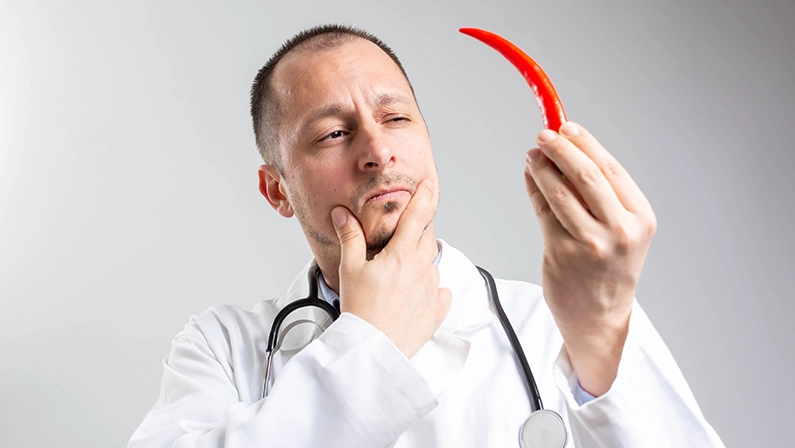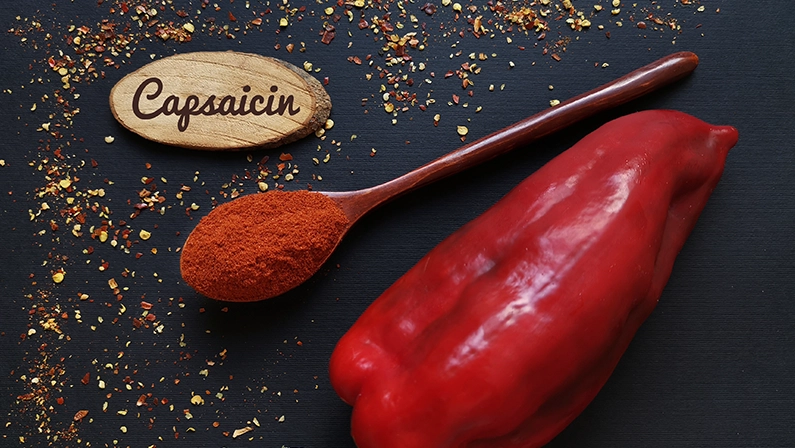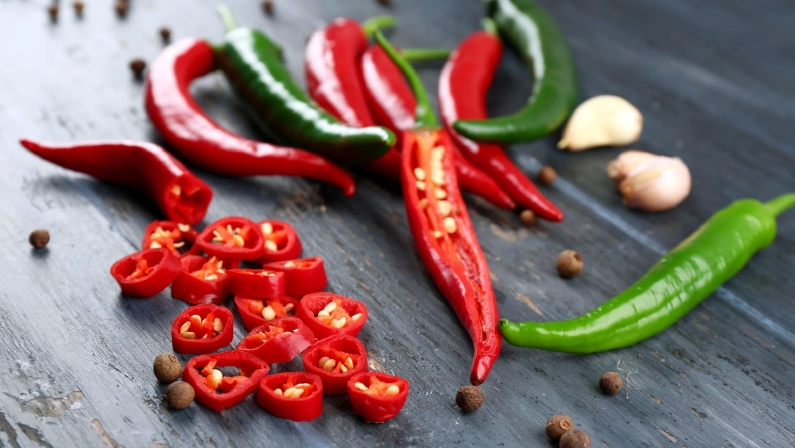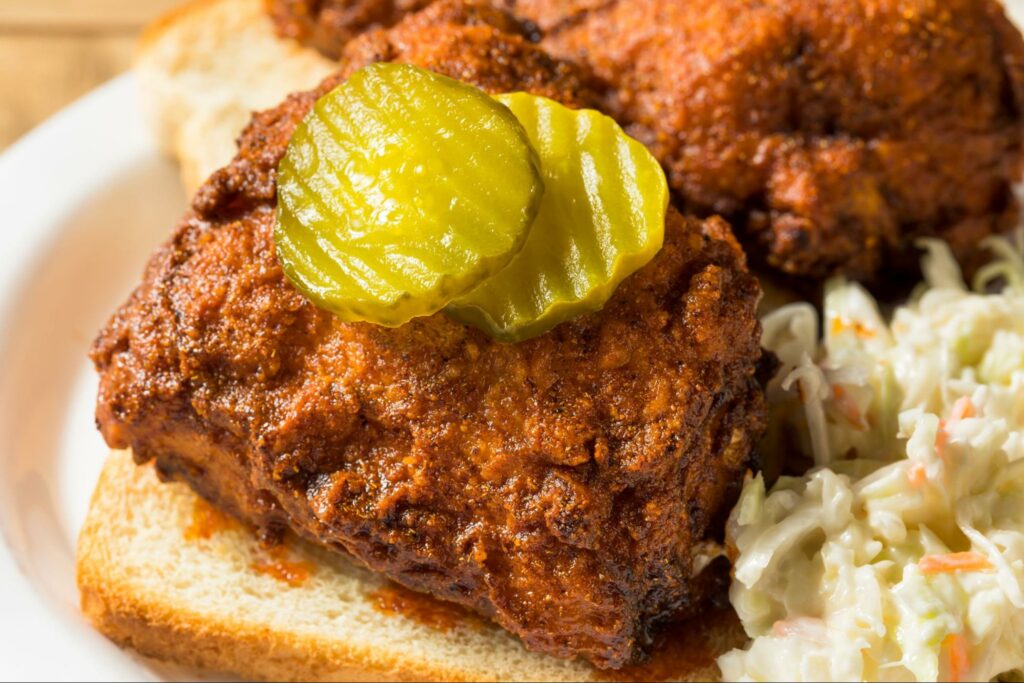Introduction
Many of us enjoy the robust flavors of spicy cuisine, but did you know these fiery dishes could also offer impressive health benefits?
Stick around as we dive deep into what makes spicy food so beneficial.
Is Spicy Food Good For Your Health?
The question of whether spicy food is good for your health has been a topic of discussion for many years.

Recent research has shown that the regular consumption of spicy foods might be linked with a myriad of health advantages, such as improved heart health, boosted metabolism, and even enhanced longevity.
What makes spicy food particularly interesting for health is not just the fact that it can add a zing to your meals, but it can also contribute significantly to your overall well-being.
What is Capsaicin?

Spicy food gets its heat from a compound known as capsaicin. Predominantly found in chili peppers, capsaicin gives these fiery foods their notable kick. But it’s not all about the heat; capsaicin is also a potent antioxidant and anti-inflammatory agent.
It is crucial in pain management and may also benefit weight loss efforts. Research is ongoing, but the potential health benefits of capsaicin continue to generate excitement in the health and wellness sector.
What Does Capsaicin Do To The Body?
Capsaicin interacts with our body’s pain receptors—particularly those found in our mouth and throat. The compound binds with these receptors and sends a message to our brain that the body is experiencing heat or discomfort, explaining why we feel the ‘burn’ after eating spicy food. However, capsaicin’s effects go beyond this sensation.

Through regular consumption, capsaicin can help to desensitize these pain receptors over time, reducing sensitivity to pain stimuli. Moreover, when our bodies react to capsaicin’s perceived burn, a natural painkiller known as endorphins is released, creating a sense of relaxation and happiness.
Capsaicin also supports digestive health by stimulating the stomach’s secretions and protecting the lining. Plus, it plays a role in thermogenesis—the body generates heat, which aids in fat-burning and weight management.
What Happens To Your Body When You Eat Spicy Food?
When you eat spicy food, capsaicin triggers your pain receptors, making your mouth feel on fire. This signal triggers your brain to think your body is overheating. In response, your body cools down, leading to sweating and flushed skin.
On the digestion level, spicy food benefits can speed up metabolism by increasing your body temperature and helping you burn more calories. Moreover, capsaicin slows your eating rate, allowing you to feel full faster and potentially aiding in weight control.
It’s worth noting that the response to spicy food can vary greatly from individual to individual.
Some people can handle high spice levels, while others may find even light spice levels uncomfortable. As with everything, listening to your body and understanding what works best for you is essential.
What Are The Benefits Of Eating Spicy Food?
So is spicy food healthy? Consumption of spicy food certainly brings more than just flavor to our plates. Here are some benefits of spices in food:
Weight Loss

Thanks to capsaicin, spicy foods can rev up your metabolism, causing the body to burn more calories and potentially assist in weight loss. Some studies suggest that capsaicin can suppress appetite, potentially leading to lower calorie intake and aiding weight control efforts.
Boost Microbiome
Spicy foods can promote a healthy gut. They can help regulate the gut’s microbiome, maintaining a balance of good bacteria in our digestive tract. Consequently, spicy foods can help improve digestion and the absorption of nutrients from our food.
Depression
Spicy foods can stimulate the brain’s production of ‘feel-good’ hormones such as serotonin. This can help alleviate feelings of anxiety and depression. While spicy food alone can’t treat depression, it can contribute to improved overall mood.
Cancer Prevention
Capsaicin has been studied for its potential anti-cancer properties. Early research suggests capsaicin may help kill certain cancer cells, slowing cancer growth. However, more research is needed in this area to make definitive conclusions.
Heart Disease
Capsaicin’s ability to reduce inflammation and improve cholesterol levels can contribute to heart health. Regular consumption of spicy foods may help lower blood pressure and prevent the hardening of arteries, reducing the risk of heart disease.
Digestion
Spicy foods can boost your digestive system by increasing digestive fluids and improving the stomach’s gastric lining, enhancing its ability to protect against harmful bacteria. As a result, spicy foods can help prevent stomach ulcers and improve overall digestive health.
Pain Relief
Capsaicin, found in spicy foods, is often used in pain relief creams and patches. When consumed, it can trigger the release of endorphins—our body’s natural way of relieving pain—providing a kind of analgesic effect. Regular consumption can result in decreased sensitivity to pain.
What Are The Negative Effects Of Eating Spicy Food?
While offering numerous health benefits, spicy food can also have some side effects for some people or when consumed in excess. Here are a few potential adverse effects:
Acid Reflux (heartburn)
Spicy foods can trigger heartburn in some people. The capsaicin can cause your stomach to produce more acid, leading to acid reflux or heartburn. If you’re prone to heartburn, consider moderating your spicy food consumption.
Diarrhea
Spicy foods can irritate the gut for some individuals, leading to loose or watery stools. If you notice an increase in diarrhea after eating spicy foods, it might be beneficial to reduce your intake.
Stomach Pain
Capsaicin can irritate the stomach lining, leading to stomach pain or discomfort, especially among those with sensitive gastrointestinal tracts or conditions like irritable bowel syndrome.
Nausea
Heavy consumption of spicy food can sometimes provoke nausea or vomiting. Consuming spicy food in moderation is always important, especially if you’re not used to eating it regularly.
Add Some Heat to Your Life with Main Bird Hot Chicken
Spice up your life and embrace the countless benefits of spicy food with Main Bird Hot Chicken’s 100% halal Nashville-style hot chicken. Wondering why we’re a favorite among the people in H-town? Here are a few reasons:
- Authentic Nashville-style Hot Chicken: Our chicken brings all the flavors and heat of true Nashville hot chicken to Sugar Land, Spring, and Cypress.
- Guaranteed Halal: We offer 100% Halal-certified chicken, ensuring that our food can be enjoyed by everyone who loves a bit of spice in their life.
- Quality Ingredients: We use only the best ingredients in our recipe. This means no additional additives, only a good serving of quality, spicy, delicious chicken.
- Spice Levels for Everyone: Whether you like your chicken mildly warm or flaming hot, we’ve got you covered. Love your chicken blazing hot? We do it like no other in H-town.
Come join the spice revolution with Main Bird Hot Chicken – your taste buds will thank you!





